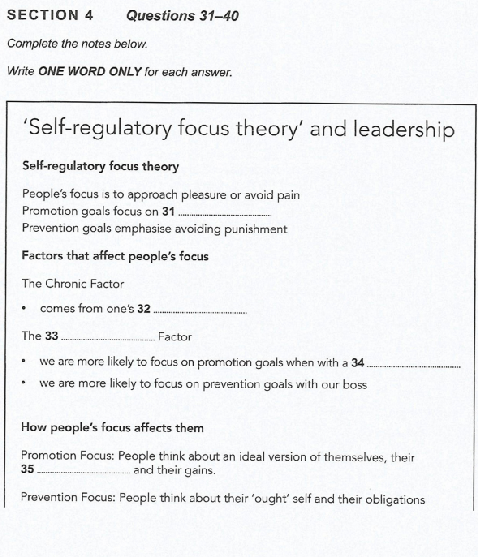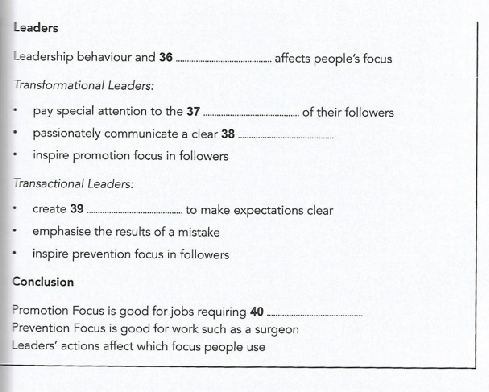剑桥雅思10听力:Test3雅思听力Section4解析
发布时间:2021-03-12 关键词:Section4
Today, I want to talk about self-regulatory focus theory and how the actions of leaders can affect the way followers approach different situations.
Self-regulatory focus theory is a theory developed by Tori Higgins.
He says that a person's focus at any given time is to either approach pleasure or avoid pain.
These are two basic motivations that each and every one of us has, and they cause us to have different kinds of goals.
Promotion goals in different life situations emphasise achievement.
Prevention goals are oriented towards the avoidance of punishment.
In a specific situation, our thoughts might focus more on promotion goals or more on prevention goals.
The theory suggests that two factors affect which goals we are focusing on.
First, there is a chronic factor.
This factor is connected to a person’s personality and says that each person has a basic tendency to either focus more on promotion goals or focus more on prevention goals as part of his or her personality.
Second, there is a situational factor which means that the context we are in can make us more likely to focus on one set of goals or the other.
For example, we are more likely to be thinking about pleasure and to have promotion goals when we are spending time with a friend.
In contrast, if we are working on an important project for our boss, we are more likely to try to avoid making mistakes and therefore have more prevention goals in our mind.
Research has shown that the goals we are focusing on at a given time affect the way we think.
For example, when focusing on promotion goals, people consider their ideal self, their aspirations and gains.
They don't think about what they can lose, so they think in a happier mode.
They feel more inspired to change.
When people are focusing on prevention goals, they think about their “ought” self.
What are they supposed to be?
What are people expecting from them?
They consider their obligations to others.
As a result, they experience more anxiety and try to avoid situations where they could lose.
Now that I have talked about the two focuses and how they affect people, I want to look at the idea that the way leaders behave, or their style of leading, can affect the focus that followers adopt in a specific situation.
In talking about leadership, we often mention transformational leaders and transactional leaders.
Transformational leaders, when interacting with their followers, focus on their development.
In their words and actions transformational leaders highlight change.
Their speech is passionate and conveys a definitive vision.
All of these things can encourage followers to think about what could be.
In other words, they inspire a promotion focus in their followers.
In contrast, transactional leaders focus on developing clear structures that tell their followers exactly what is expected of them.
While they do explain the rewards people will get for following orders, they emphasise more how a follower will be punished or that a follower won't get rewarded if his or her behaviour doesn't change.
In short, they emphasise the consequences of making a mistake.
This emphasis will clearly lead followers to focus on avoiding punishment and problems.
This is clearly a prevention focus.
In conclusion, it is important to understand that one focus is not necessarily better than the other one.
For a designer who works in a field where a lot of innovation is needed, a promotion focus is probably better.
In contrast, a prevention focus which causes people to work more cautiously and produce higher quality work might be very appropriate for a job like a surgeon, for example.
The main point of the research, though, is that the actions of leaders can greatly influence whether people approach a situation with more of a promotion focus or more of a prevention focus.


Question 31
答案:achievement / achievements
定位:判断题目中的关键词为 promotional goals、focus on。
解析:录音当中明确指出“Promotional goals... emphasise achievement”,考生只需要辨析出题目中的关键词 focus on 与录音当中的 emphasised 同义替换,即可正确填写此空,因此本题较容易。
Question 32
答案:personality / character
定位:判断题目中的关键词为 chronic factor、come from,而 come from 通常表示因果关系。
解析: 录音中明确提及 “this factor is connected to a person’s personality”,而 “be connected to”也常常表达因果关系,因此本题亦较容易。
Question 33
答案:Situational
定位:题目中的关键词是 factor。通过此题笔记的结构,判断此空与前面的 chronic 是并列关系。
解析:录音中提到“first... chronic factor”,后面又说道“second...”。这时考生就应该注意,答案马上就应该出现了。此题要求我们对题目当中给出的文章笔记结构框架做出判断。注意首字母大写,和 Factor 中的 F 对应。
Question 34
答案:friend
定位:判断题目当中的关键词 more likely、promotion goals、when。
解析:录音当中提到 when we are spending time with a friend”,此句表达的意思与题目相同,另外这个句子当中和题目当中都使用了介词 with,也能帮助考生解题。本题也较为容易。
Question 35
答案:aspirations / ambitions
定位:判断题目当中的关键词为 themselves、gains。
解析: 题目当中 themselves 与要填的词以及 their gains 是明显的并列关系,题目当中的 think about 与录音当中的 consider 是同意替换。因此本空填但是要注意该词的正确拼写,并且答 案的并列成分是 gains,答案要求也是复数形式。
Question 36
答案:style
定位: 判断题目当中关键词为 behaviour 和 affect。
解析:录音中提到“the way leaders behave”,其中 behave 与题目当中的 behaviour 是同义转换,录音中与其并列的成分是“their style of leading”,因此本空填写 style。
Question 37
答案:development
定位:判断题目当中的关键词为 special attention 与 followers。
解析:录音当中提及“…when interacting with their followers, focus on their development” 正好对应此题题目中的 pay special attention to。与其中 focus on 是同义替换。因此此空填写 development, 为简单。
Question 38
答案:vision
定位:判断题目当中的关键词为 passionately、communicate 和 clear。
解析:录音当中的passionate与题目当中的passionately是对应关系,convey与communicate 是同义替换,definitive 与 clear 也是同义替换。因此本题要求考生清楚地识邀种对应关系,难度一般。
Question39
答案:structures
定位:判断题目中关键词为 create 与 expectation。
解析:录音当中提到 developing clear structures that tell…exactly what is expected of them”,其中 develop 与题目当中的 create 是对应关系,tell... exactly what is expected of them 指的就是 make expectation dear,所以 structures 是正确答案。但是对于部分考生来说,辨识这种同义关系比较困难。因此本题较难。
Question 40
答案:innovation / innovations
定位:判断题目当中的关键词为 Promotion Focus 和 require。
解析:录音当中提到 “...innovation is needed, a promotion focus is... better,其中 be needed 与题目当中的 require 是同义转换。本题需要注意主语在后面出现的情况,难度中等。




